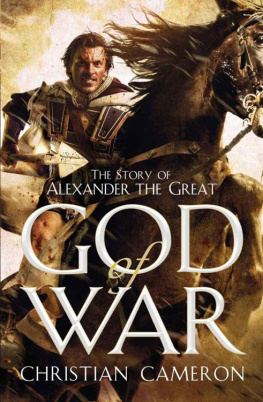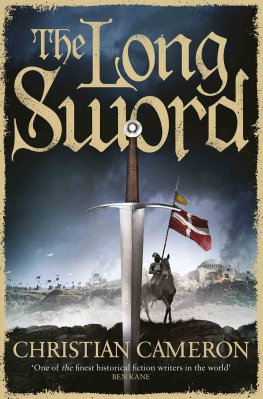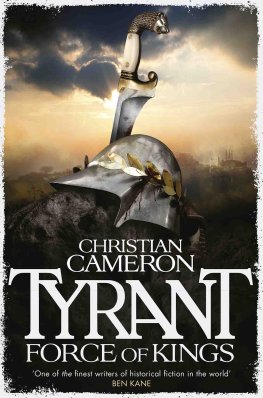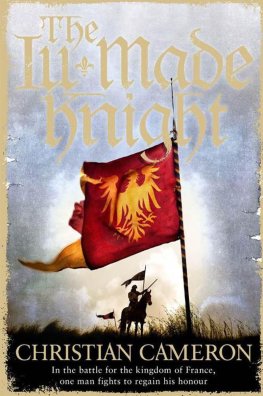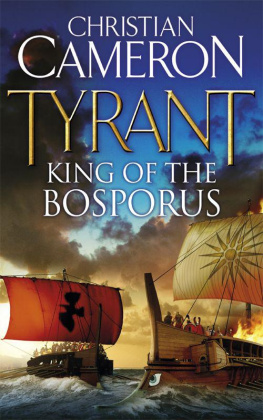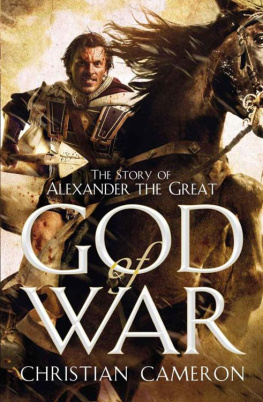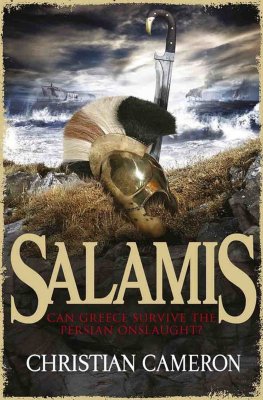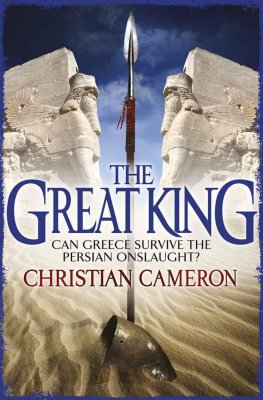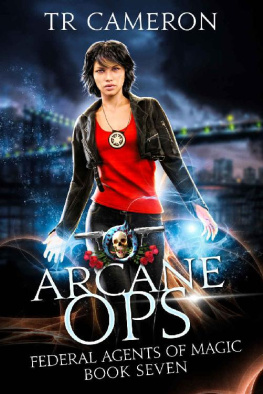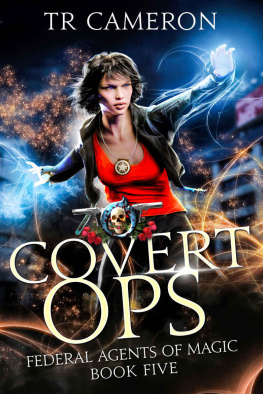Christian Cameron - Marathon: Freedom or Death
Here you can read online Christian Cameron - Marathon: Freedom or Death full text of the book (entire story) in english for free. Download pdf and epub, get meaning, cover and reviews about this ebook. genre: Adventure. Description of the work, (preface) as well as reviews are available. Best literature library LitArk.com created for fans of good reading and offers a wide selection of genres:
Romance novel
Science fiction
Adventure
Detective
Science
History
Home and family
Prose
Art
Politics
Computer
Non-fiction
Religion
Business
Children
Humor
Choose a favorite category and find really read worthwhile books. Enjoy immersion in the world of imagination, feel the emotions of the characters or learn something new for yourself, make an fascinating discovery.

- Book:Marathon: Freedom or Death
- Author:
- Genre:
- Rating:3 / 5
- Favourites:Add to favourites
- Your mark:
- 60
- 1
- 2
- 3
- 4
- 5
Marathon: Freedom or Death: summary, description and annotation
We offer to read an annotation, description, summary or preface (depends on what the author of the book "Marathon: Freedom or Death" wrote himself). If you haven't found the necessary information about the book — write in the comments, we will try to find it.
Marathon: Freedom or Death — read online for free the complete book (whole text) full work
Below is the text of the book, divided by pages. System saving the place of the last page read, allows you to conveniently read the book "Marathon: Freedom or Death" online for free, without having to search again every time where you left off. Put a bookmark, and you can go to the page where you finished reading at any time.
Font size:
Interval:
Bookmark:
Christian Cameron
Marathon: Freedom or Death
For the craftspeople who bring history to life from vases to swords, horn cups to armour, kitchen knives to jewelry.
Glossary
I am an amateur Greek scholar. My definitions are my own, but taken from the LSJ or Routeledges Handbook of Greek Mythology or Smiths Classical Dictionary. On some military issues I have the temerity to disagree with the received wisdom on the subject. Also check my website at www.hippeis.com for more information and some helpful pictures.
Akinakes A Scythian short sword or long knife, also sometimes carried by Medes and Persians.
Andron The mens room of a proper Greek house where men have symposia. Recent research has cast real doubt as to the sexual exclusivity of the room, but the name sticks.
Apobatai The Chariot Warriors. In many towns, towns that hadnt used chariots in warfare for centuries, the Apobatai were the elite three hundred or so. In Athens, they competed in special events; in Thebes, they may have been the forerunners of the Sacred Band.
Archon A citys senior official or, in some cases, one of three or four. A magnate.
Aspis The Greek hoplites shield (which is not called a hoplon!). The aspis is about a yard in diameter, is deeply dished (up to six inches deep) and should weigh between eight and sixteen pounds.
Basileus An aristocratic title from a bygone era (at least in 500 BC) that means king or lord.
Bireme A warship rowed by two tiers of oars, as opposed to a trireme, which has three tiers.
Chiton The standard tunic for most men, made by taking a single continuous piece of cloth and folding it in half, pinning the shoulders and open side. Can be made quite fitted by means of pleating. Often made of very fine quality material usually wool, sometimes linen, especially in the upper classes. A full chiton was ankle length for men and women.
Chitoniskos A small chiton, usually just longer than modesty demanded or not as long as modern modesty would demand! Worn by warriors and farmers, often heavily bloused and very full by warriors to pad their armour. Usually wool.
Chlamys A short cloak made from a rectangle of cloth roughly 60 by 90 inches could also be worn as a chiton if folded and pinned a different way. Or slept under as a blanket.
Corslet/Thorax In 500 BC, the best corslets were made of bronze, mostly of the so-called bell thorax variety. A few muscle corslets appear at the end of this period, gaining popularity into the 450s. Another style is the white corslet, seen to appear just as the Persian Wars begin reenactors call this the Tube and Yoke corslet, and some people call it (erroneously) the linothorax. Some of them may have been made of linen well never know but the likelier material is Athenian leather, which was often tanned and finished with alum, thus being bright white. Yet another style was a tube and yoke of scale, which you can see the author wearing on his website. A scale corslet would have been the most expensive of all, and probably provided the best protection.
Daidala Cithaeron, the mountain that towered over Plataea, was the site of a remarkable fire-festival, the Daidala, which was celebrated by the Plataeans on the summit of the mountain. In the usual ceremony, as mounted by the Plataeans in every seventh year, a wooden idol (daidalon) would be dressed in bridal robes and dragged on an ox-cart from Plataea to the top of the mountain, where it would be burned after appropriate rituals. Or, in the Great Daidala, which were celebrated every forty-nine years, fourteen daidala from different Boeotian towns would be burned on a large wooden pyre heaped with brushwood, together with a cow and a bull that were sacrificed to Zeus and Hera. This huge pyre on the mountain top must have provided a most impressive spectacle; Pausanias remarks that he knew of no other flame that rose as high or could be seen from so far.
The cultic legend that was offered to account for the festival ran as follows. When Hera had once quarrelled with Zeus, as she often did, she had withdrawn to her childhood home of Euboea and had refused every attempt at reconciliation. So Zeus sought the advice of the wisest man on earth, Cithaeron (the eponym of the mountain), who ruled at Plataea in the earliest times. Cithaeron advised him to make a wooden image of a woman, to veil it in the manner of a bride, and then to have it drawn along in an ox-cart after spreading the rumour that he was planning to marry the nymph Plataea, a daughter of the river god Asopus. When Hera rushed to the scene and tore away the veils, she was so relieved to find a wooden effigy rather than the expected bride that she at last consented to be reconciled with Zeus. (Routledge Handbook of Greek Mythology, pp. 137-8)
Daimon Literally a spirit, the daimon of combat might be adrenaline, and the daimon of philosophy might simply be native intelligence. Suffice it to say that very intelligent men like Socrates believed that godsent spirits could infuse a man and influence his actions.
Daktyloi Literally digits or fingers, in common talk inches in the system of measurement. Systems differed from city to city. I have taken the liberty of using just the Athenian units.
Despoina Lady. A term of formal address.
Diekplous A complex naval tactic about which some debate remains. In this book, the Diekplous, or through stroke, is commenced with an attack by the ramming ships bow (picture the two ships approaching bow to bow or head on) and cathead on the enemy oars. Oars were the most vulnerable part of a fighting ship, something very difficult to imagine unless youve rowed in a big boat and understand how lethal your own oars can be to you! After the attacker crushes the enemys oars, he passes, flank to flank, and then turns when astern, coming up easily (the defender is almost dead in the water) and ramming the enemy under the stern or counter as desired.
Doru A spear, about ten feet long, with a bronze butt-spike.
Eleutheria Freedom.
Ephebe A young, free man of property. A young man in training to be a hoplite. Usually performing service to his city and, in ancient terms, at one of the two peaks of male beauty.
Eromenos The beloved in a same-sex pair in ancient Greece. Usually younger, about seventeen. This is a complex, almost dangerous subject in the modern world were these pair-bonds about sex, or chivalric love, or just a brotherhood of warriors? I suspect there were elements of all three. And to write about this period without discussing the eromenos/erastes bond would, I fear, be like putting all the warriors in steel armour instead of bronze. .
Erastes The lover in a same-sex pair bond the older man, a tried warrior, twenty-five to thirty years old.
Eudaimonia Literally well-spirited. A feeling of extreme joy.
Exhedra The porch of the womens quarters in some cases, any porch over a farms central courtyard.
Helots The race of slaves of Ancient Sparta the conquered peoples who lived with the Spartiates and did all of their work so that they could concentrate entirely on making war and more Spartans.
Hetaira Literally a female companion. In ancient Athens, a
Font size:
Interval:
Bookmark:
Similar books «Marathon: Freedom or Death»
Look at similar books to Marathon: Freedom or Death. We have selected literature similar in name and meaning in the hope of providing readers with more options to find new, interesting, not yet read works.
Discussion, reviews of the book Marathon: Freedom or Death and just readers' own opinions. Leave your comments, write what you think about the work, its meaning or the main characters. Specify what exactly you liked and what you didn't like, and why you think so.

